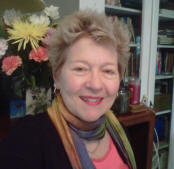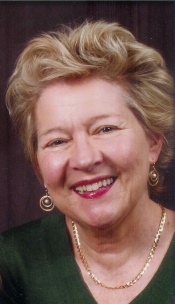|
|
|
December 2011 |
|
|

"Using Music in the Hospital"
Dr. Alice H. Cash is often asked to share her
Grand Rounds Presentation with hospitals' doctors and staff. Learn
what is currently happening around the world and the results they are
having.
|

"It was the
easiest of all hand surgeries! I was listening to music, then a slight
lull of nothing and then back to the music. Wonderfully comfortable. The
best surgical experience yet. I am honored to know, worked with and
utilized Dr. Cash's magnificent creation. I do hope the medical field
understands the import of her invention!"
Sheryl S.
Louisville, KY |
|
|
|
|
|
News Item |
|
Stepping into the New Year with
Healing Music
The holidays are almost over now, and although many good times were
had, there were also stressful moments for everyone I'm sure!
Holidays are just plain stressful for almost everybody because
expectations get built up so easily. As a therapist, I can tell you that
everyone wants a Norman Rockwell or a Hallmark Christmas,
Thanksgiving or Hanukkah. Rarely does it happen that way.
Now we have a fresh and beautiful
New Year and, after the last strains of "Auld Lang Syne" have faded
away, you get to choose, mindfully, what you will listen to!
What will you choose this year?
Just remember that healing music
can be generally divided into two categories: sedative music
and stimulative music. The genre is not as important as the
mood of the music and how it affects you. You may prefer jazz,
classical, New Age, or even country music. The healing effects
of music will only be present for you, if you like the music.
It doesn't have to be familiar, although when people are not feeling
well, they tend to prefer familiar music.
Another rule of thumb is that the
sicker a person is, the less likely they are to respond well to
music with lyrics. Go for a simple, instrumental favorite such
as "Pachelbel's Canon," "Amazing Grace," or "Londonderry Air."
The music on my surgery playlist is all classical, calming music with a
steady tempo and a serene mood.
When you want to energize yourself
for a run, a major house-cleaning day or just to lift your spirits,
choose something that is a long-time, upbeat favorite...possibly
from your teen-age years! I love the oldies stations and they
will get me singing along faster than most anything else.
The idea is to choose your music
mindfully. Some people are very picky about their music
and others will just turn on their iPod or radio or CD player and
listen to whatever comes up! Be your own best healing music DJ
in the upcoming year and have fun doing it! As always, let me
know if I can help! Have a Happy and Healthy New Year.
|
|
Healing Music Blog |
|
Music is Good for your Health: But
we knew that!
Dr. Paul Roumeliotis, MD, CM, MPH, FRCP(C)
Medical Officer of Health and Chief Executive Officer, Eastern
Ontario Health Unit
In fact, Music Therapy is a recognized form of treatment for a
variety of disorders and conditions.

Dr. Cash with Flautist, Carol
Cutler |
The American Music Therapy Association
(AMTA) states that “Music therapy is an established health-care
profession that uses music to address physical, emotional,
cognitive, and social needs of individuals of all ages.”
I am sure that you will agree that playing music or listening to
your favorite tunes makes us feel good.
So now, wearing my medical hat, I want
to look at the scientific evidence that confirms what we all think
and feel. Here are seven proven benefits of music:
Read Complete Posting
As we enter a new year, a resolution to listen to or play more music
is a healthy one.
I wish you and yours a happy, health and musical New Year!
Read Complete Posting |
|
10 Basic Concepts of Healing
Music |
Learn How Music "Heals"
Using 3 different presentations we will offer you
10 concepts. You will
learn just how music can change and improve your everyday life.
Additional Information
| Baby Boomers
Presentation |
$
19.97 |
| Mozart
Presentation |
$
19.97 |
| Music &
Mind-Body Course |
$
47.00 |
| The Sampler |
$
19.97 |
|
Total List
Price |
$ 106.91 |
|
Package Price $ 37 |
|

Buy Now - Immediate Download
|
|
|
Surgery and Music Blog |
|

Newborn Baby at Christmas
 All
over the world today, Christmas babies were born. Having a baby on
Christmas day is indeed a special thing and these babies have got to
feel special for their entire lives. Earlier today, I was talking
with my son-in-law who is an anesthesia resident at a large hospital
in Boston. I asked him how many of the Moms that gave birth today
used music during their procedure and was surprised to hear that not
many of them did!? All
over the world today, Christmas babies were born. Having a baby on
Christmas day is indeed a special thing and these babies have got to
feel special for their entire lives. Earlier today, I was talking
with my son-in-law who is an anesthesia resident at a large hospital
in Boston. I asked him how many of the Moms that gave birth today
used music during their procedure and was surprised to hear that not
many of them did!?
Of course, he pointed out that he was only present for C-sections
and those are very different from vaginal delivery births where the
mom has gone into labor on her own and hopefully, planned her
childbirth experience very intentionally.
Over the years, Moms and doctors have
told me of babies born on Christmas to the strains of “For Unto Us a
Child is Born,” “O Holy Night,” and other appropriate Christmas
birthing music! The fact is, music during labor can do lots of
wonderful things, from calming, comforting and distracting the Mom
between contractions, to actually keep labor moving along with a
consistent, persistant rhythmic beat. I’ve always thought that
Ravel’s “Bolero” during labor would be quite enjoyable and helpful!
If you or a loved one had a baby at
Christmas, please share your experience with me!
Read Complete
Blog
|
|
Brain and Music Blog |
|
New Research from Stanford on How
the Brain Processes Music
Everyone knows the horrible story of the shooting of Senator
Gabrielle Giffords. At the time of the shooting, her doctors were
not sure she would even survive, much less recover. Today, she is a
shining star of what modern medicine can accomplish…with a little
help from the field of music therapy!
 Research
published earlier this year showed that
listening to music releases the neurotransmitter
dopamine in the brain and sends pleasure signals
to the rest of the body. Now findings recently
published in NeuroImage offer additional
insights into how music affects our neural
circuits. Research
published earlier this year showed that
listening to music releases the neurotransmitter
dopamine in the brain and sends pleasure signals
to the rest of the body. Now findings recently
published in NeuroImage offer additional
insights into how music affects our neural
circuits.
In the
study Finnish researchers recorded the brain
responses of individuals who were listening to a
piece of modern Argentinian tango using
functional magnetic resonance imaging (fMRI)
technology. Afterwards, they used computer
algorithms to analyze the musical content of the
tango and illustrate how its rhythmic, tonal and
timbral components evolved over time. They then
compared the brain responses and the musical
features. Medical News Today
reports:
The
researchers found that music listening
recruits not only the auditory areas of the
brain, but also employs large-scale neural
networks. For instance, they discovered that
the processing of musical pulse recruits
motor areas in the brain, supporting the
idea that music and movement are closely
intertwined.
Limbic areas of the brain, known to be
associated with emotions, were found to be
involved in rhythm and tonality processing.
Processing of timbre was associated with
activations in the so-called default mode
network, which is assumed to be associated
with mind-wandering and creativity.
Similarly, a
past Stanford study showed music engages the
areas of the brain involved with paying
attention, making predictions and updating the
event in memory. The findings also suggest that
music can help the brain organize incoming
information.
Published by
Stanford University School of Medicine. article
by Lia Steakley
Read Complete
Blog |
|
Alice H. Cash |
 For nearly two decades, I've been helping people use the music that
they already love to heal their lives and increase their wellness
quotient!
I
am one of the world's only clinical musicologists and hold
a Masters degree in piano performance, a Ph.D. in
musicology and a Master of Social Work in clinical social work. I
am also a licensed clinical social worker. I work with people and
diagnoses of all kinds, enabling them to find healing, acceptance and
hope. For nearly two decades, I've been helping people use the music that
they already love to heal their lives and increase their wellness
quotient!
I
am one of the world's only clinical musicologists and hold
a Masters degree in piano performance, a Ph.D. in
musicology and a Master of Social Work in clinical social work. I
am also a licensed clinical social worker. I work with people and
diagnoses of all kinds, enabling them to find healing, acceptance and
hope.I love
performing, researching, and teaching and have put them all together
in a career called "Music Medicine."
See you next month!!
Alice Cash |
|
|
 Research
published earlier this year showed that
listening to music releases the neurotransmitter
dopamine in the brain and sends pleasure signals
to the rest of the body. Now findings recently
published in NeuroImage offer additional
insights into how music affects our neural
circuits.
Research
published earlier this year showed that
listening to music releases the neurotransmitter
dopamine in the brain and sends pleasure signals
to the rest of the body. Now findings recently
published in NeuroImage offer additional
insights into how music affects our neural
circuits.









 For nearly two decades, I've been helping people use the music that
they already love to heal their lives and increase their wellness
quotient!
I
am one of the world's only clinical musicologists and hold
a Masters degree in piano performance, a Ph.D. in
musicology and a Master of Social Work in clinical social work. I
am also a licensed clinical social worker. I work with people and
diagnoses of all kinds, enabling them to find healing, acceptance and
hope.
For nearly two decades, I've been helping people use the music that
they already love to heal their lives and increase their wellness
quotient!
I
am one of the world's only clinical musicologists and hold
a Masters degree in piano performance, a Ph.D. in
musicology and a Master of Social Work in clinical social work. I
am also a licensed clinical social worker. I work with people and
diagnoses of all kinds, enabling them to find healing, acceptance and
hope.